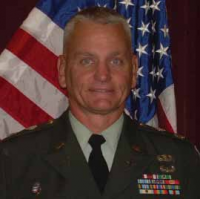Army Chaplaincy Comes to ICAR
 This fall inaugurates the launch of the US Army War College Senior Service Chaplain Fellowship Program at the Institute for Conflict Analysis and Resolution (ICAR). This fellowship is intended to expand Army Chaplaincy advisory capabilities, supporting both the field commanders in their need to understand and intervene non-violently in religious conflict, but also supporting the Army's Chaplaincy in their effort to develop curriculum and case research toward enhancing the education of Army chaplains. These twinned and layered goals, serving the needs of commanders in the field of operation, as well as serving the needs of the chaplains, who in turn serve the needs of service men and women, are the foundation of the research program for the fellowship.
This fall inaugurates the launch of the US Army War College Senior Service Chaplain Fellowship Program at the Institute for Conflict Analysis and Resolution (ICAR). This fellowship is intended to expand Army Chaplaincy advisory capabilities, supporting both the field commanders in their need to understand and intervene non-violently in religious conflict, but also supporting the Army's Chaplaincy in their effort to develop curriculum and case research toward enhancing the education of Army chaplains. These twinned and layered goals, serving the needs of commanders in the field of operation, as well as serving the needs of the chaplains, who in turn serve the needs of service men and women, are the foundation of the research program for the fellowship.
This year, Chaplain Ira Houck is recipient of the US Army War College Senior Service Chaplain Fellowship at ICAR. Chaplain (LTC) Ira Houck is an active duty Army Chaplain; he is also an Episcopal priest, ordained in 1980, entering active duty in 1992. He is a veteran of Iraq, Afghanistan, Korea, and served in Special Operations and Military Intelligence commands with duty in the Caribbean region and South America. Chaplain Houck is the author of "Developing Ministries to and with People with Disabilities," (Pittsburgh Theological Seminary Doctoral dissertation, 1991).
 The Army Chief of Chaplains selected Chaplain Houck to expand Chaplaincy advisory capabilities. While at ICAR, Chaplain Houck will be completing coursework to obtain a certificate in World Religions, Diplomacy and Conflict Resolution. In fulfillment of one of his requirements for his fellowship, he will also be conducting research on the nature of religious conflict, towards the development of an analytic framework that could be used to support decision making in the field and geared toward reconciliation and conflict resolution. As Chaplain Houck notes, "The Chaplaincy, through application of new discoveries in behavioral science, conflict analysis and resolution, human needs theory, and gestures of reconciliation and atonement, can amplify and improve the command's ability to deal with dimensions of the U.S. mission impacted by religion."
The Army Chief of Chaplains selected Chaplain Houck to expand Chaplaincy advisory capabilities. While at ICAR, Chaplain Houck will be completing coursework to obtain a certificate in World Religions, Diplomacy and Conflict Resolution. In fulfillment of one of his requirements for his fellowship, he will also be conducting research on the nature of religious conflict, towards the development of an analytic framework that could be used to support decision making in the field and geared toward reconciliation and conflict resolution. As Chaplain Houck notes, "The Chaplaincy, through application of new discoveries in behavioral science, conflict analysis and resolution, human needs theory, and gestures of reconciliation and atonement, can amplify and improve the command's ability to deal with dimensions of the U.S. mission impacted by religion."
As Director, I am delighted with the creation of this Fellowship; it opens a door for ICAR to provide frameworks for understanding the complex relationship between religion and conflict, frameworks that can positively impact the decisions of military leaders in the field, reducing violence and promoting conflict prevention. We certainly want to do all that we can to ensure that leaders, military and political alike, will have the analytic tools to be able to interrupt cycles of violence and avoid becoming, themselves, agents in conflict escalation.




